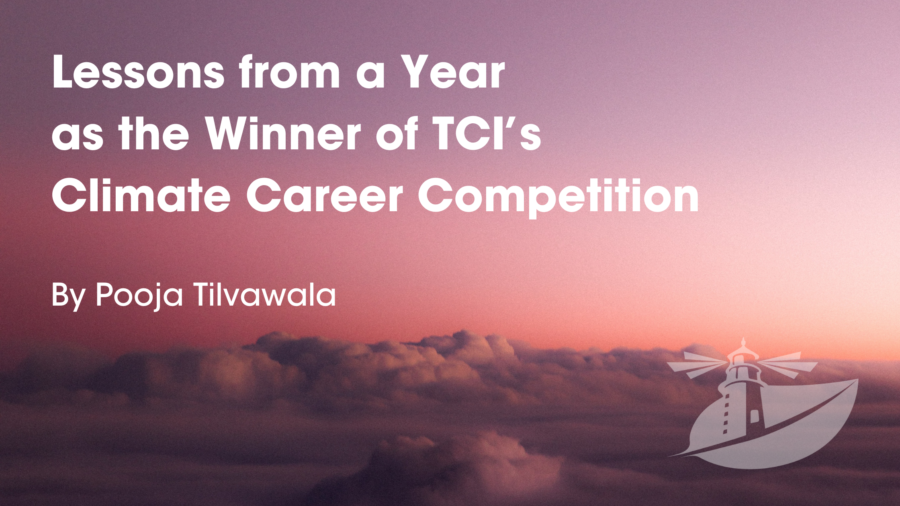#careers
Lessons from a Year as the Winner of TCI’s Climate Career Competition
By Pooja Tilvawala
I want to begin with a huge thank you from the bottom of my heart to the hardworking team of The Climate Initiative (TCI) for enabling me to turn my vision of Youth Climate Collaborative (YCC) into a reality. This past year afforded me the time, financial support, mentorship, and freedom to try out different ideas, learn more about the youth climate space, and build relationships with people combating climate change all around the world.
Leading YCC from November 2020 until November this year meant wearing several hats – HR, Strategy, Programs, Finance, Development, Partnerships, Communications, and more – to carry forward our mission and vision. The following are ten takeaways from my experience in these roles.

1. Take the first step.
It can be difficult to take the first step. You might be waiting for the “perfect” situation, for people to agree with you, or until you feel you are good enough at a certain skill. I have learned that learning as you go is fine and encouraged! Ask questions, seek advice, and try your best, but be sure to take that first step sooner rather than later.
2. Learn to accept both failure and success.
Every decision and step you take reflects your knowledge at that time. Sometimes they lead to success, and other times failure, but each time you will learn more about what works and doesn’t work so you can make better decisions the next time. It is easy to get stuck in disappointment about what could not be accomplished, but it is wiser to move on to the next thing or change your approach.
3. Make commitments wisely and follow through on your words.
The youth climate space is vibrant and overflowing with webinars, networks, and information. It can be tempting to sign up for every cool opportunity, but that can easily lead to burnout or take time away from your current work or cause you to fall short on your existing promises. It is therefore important to find a balance between staying focused on the work you are already leading and welcoming the new opportunities that come your way.
4. Plans are important!
Your plan acts as a roadmap for your organization’s future and provides you and your team direction for where to go and how to get there. Mapping out goals, both short term and long term also helps to keep the ball rolling.
5. Balance planning with experimentation.
Yes, plans are important, and yes, experimenting is important too. Creating roadmaps is important for having direction, but leaving room for some experimentation allows for adaptability if you are faced with unexpected outcomes and opportunities. The key here is to maintain clear communication with your team about any experimenting so everyone is kept on the same page and confusion is avoided.
6. Stay focused on the bigger picture and take steps to bridge the gap between reality and your vision.
It is important to take action to create the change you wish to see, but the action should be guided by your vision. As you are doing the work, remind yourself of your why and as you are reflecting on your vision, think of the concrete steps that will get you there. In addition, remember to share your vision with your team and others. Shared visions and meaningful relationships are strong incentives to motivate people!
“Vision without action is merely a dream. Action without vision just passes the time. Vision with action can change the world.” – Joel Barker
7. You can’t do everything alone (and it’s not as fun).
Share your vision with others and welcome their support. Learn of the different skill sets of each member of your team and create an atmosphere which encourages everyone to lean on each other, complement each other, teach each other, and collaborate. A team of part-time employees working remotely at varying hours can make teamwork difficult for example, but this is where effective communication is key. Once communication is figured out, the creativity and fun that blossoms from the enabled teamwork takes the work in positive directions.
8. Get to know people in this space and the space itself.
There is a lot of cool work going on in the youth climate space and it is important to read about different organizations, leaders, and topics. It is a lot of fun to reach out to people working on climate change to learn about their work, and you never know, these connections can turn into collaborations or even friendships!
9. Know your spheres of influence and your mentors.
What inspires you? Who motivates you? Why do you do what you do? What effects your decision-making? Reflect on your spheres of influence and think about who you can turn to for advice and mentorship. Without my mentors at TCI and outside of TCI, I would not be where I am or who I am now. It is one of life’s greatest gifts to have a support system and inspiration system. Therefore, it is important to nurture these relationships.
10. Know your why.
What is your story? Why are you doing what you do? When you know your story, your life purpose, and what drives you, you become more aware of yourself as an individual and your connection with others and the world at large. Your why may change over time, but it is important to answer this question as best as you can.
The Climate Initiative would like to officially welcome Pooja as she transitions from our Climate Career winner to a full time member of our team as our Youth Engagement Officer, where she will continue her work on a domestic and global scale. Welcome, Pooja!
